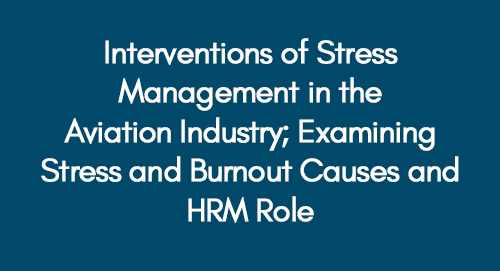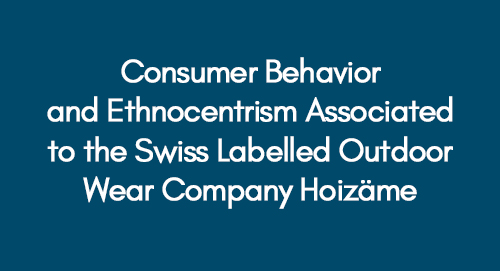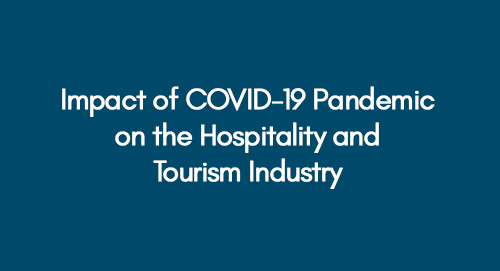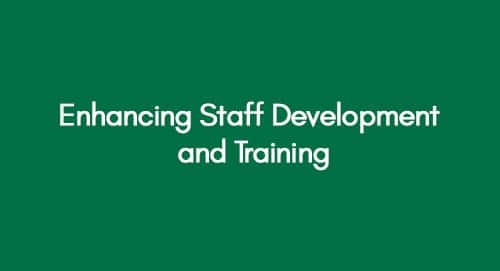
Interventions of Stress Management in the Aviation Industry; Examining Stress and Burnout Causes and HRM Role
June 2, 2022
Consumer Behavior and Ethnocentrism Associated to the Swiss Labelled Outdoor Wear Company Hoizäme
June 2, 2022The following text comprises the text of the study.
Introduction
This comprehensive research is based on the evaluation of the impact of the COVID-19 pandemic on the hospitality and tourism industry. Following the research background and main objectives, certain previous literature articles are targeted for suitable data collection. The research is concluded with data analysis and limitations.
Contextual Background
One of the fastest-growing and biggest sectors is tourism, which is considered a vulnerable industry. Therefore, the tourism industry is the most affected due to internal or external stresses (Liu, Pennington-Gray, and Krieger, 2016). These factors can be changes in weather conditions, increased taxes, utilization of new technologies, cultural and environmental challenges, etc.
New Tourism Dissertation Topics
In this regard, the recent coronavirus outbreak (COVID-19) has greatly impacted the various countries' tourism sectors (Hoque et al., 2020). Moreover, the pandemic has caused a serious global crisis with the cancellations of public events, trips, temporary employment repercussions, etc. Similarly, the hotel and hospitality industry has faced a hard hit due to the spread of the coronavirus, especially during the Lunar New Year, which is one of the busiest seasons for travelling in the hotel industry (Honerkamp, 2020).
Research Aims and Objectives
Aim
The study's main aim is to assess the effects of viruses on the hospitality and tourism industry.
Objectives
To accomplish the aim mentioned above, the following objectives have been devised:
- To study the potential factors that are pertinent to a virus that can affect a country’s hospitality and tourism industry
- To assess the negative impact of the COVID-19 pandemic on hospitality and tourism industry of the country
- To provide recommendations regarding the measures a country can take to avoid being impacted by medical viruses, especially for the hospitality and tourism industry.
The tourism industry is facing challenges and is entering a crisis due to the worldwide pandemic of COVID-19.
Research Problem
Furthermore, according to the study by Bai et al. (2020), the extent and the scope of COVID-19 are still unknown. Similarly, the Ramelli and Wagner (2020) study mentions that COVID-19 has already damaged the stock market, affecting the major sectors and industries. The study by Chinazzi et al. (2020) states that with travel restrictions in place, the tourism and hospitality industry is suffering from a major financial constraint. Furthermore, the authorities are also comparing the global pandemic of COVID-19 to SARS or H1N1, which also harmed the tourism and hospitality industry.
Analytic Study of Pandemic and Financial Crises
The study by Hoque et al. (2020) discusses that the tourism industry of countries such as China can be considered the most affected due to COVID-19 because China's tourism industry has contributed 11% to its overall GDP growth, accounting for $1.35 trillion in total revenue. Therefore, with such a damaging impact on the economy and the tourism industry, UNWTO and WHO suggested the tourism industry create a measured and consistent approach regarding the tourism guidelines for the safety and security of public health. Therefore, the study identifies that the spread of a global pandemic can cause severe damage to the tourism industry.
Study Rationale
This study aims to assess the research area around the impact of the COVID-19 pandemic on the hospitality and tourism industry. Furthermore, the study of Carroll et al. (2015) also states that measuring the damaging effects of the virus can be difficult. Similarly, the study by Wang et al. (2020) mentions that preparing and designing a contingency plan for reducing the virus also requires significant time. Therefore, the gap identified in the study is the limited literature on the impact of the COVID-19 pandemic on the hospitality and tourism industry.
Significance of Destination Branding In the Development of the Dark Tourism Sector
According to the study by Liu, Pennington-Gray, and Krieger (2016), the tourism crisis management literature is limited. Furthermore, most of the studies in the literature focus on the spread of viruses in a specific area or a country and often fail to mention its effects on the tourism and hospitality industry. As per the study by Nokso-Koivisto, Marom, and Chonmaitree (2015), it is imperative to understand the risks associated with viruses and their impact on different industries. Therefore, the study aims to assess the impact of the COVID-19 pandemic on the hospitality and tourism industry.
Significance of the Study
The study regarding the effects of the virus on the hospitality and tourism industry can be considered significant because it would enable the researchers to analyze the effects of the virus more descriptively and effectively. Furthermore, the research will enable the hospitality industry to develop certain contingency plans that will be crucial for mitigating the effects of the virus on the hospitality industry. Furthermore, with the current pandemic situation of COVID-19, the research will be essential in providing relevant data and recommendations that a country can take to avoid the impact of medical viruses specific to the tourism and hospitality industry.
A study by Grand (2016) mentions that airlines, cruises, and hotels are some industries that face repercussions associated with an outbreak of a virus.
Literature Review
Furthermore, the cancellation of public events and trips, income downfall, and unemployment have already caused a global impact on economies and organisations. A study by Fernandes (2020) mentions that most tourism companies are cancelling their trips for arrival and departure, which causes a severe negative impact of the COVID-19 pandemic on the tourism and hospitality industry. Cancellation of employee trips to nations affected by the virus can lead to unemployment in the tourism industry and a negative economic impact on the country's GDP. The pandemic of COVID-19 is estimated to create a risk for 50 million jobs in the sector of tourism and travel (McKibbin and Fernando, 2020). Furthermore, it is estimated that the travel and hospitality industry in Asia will be most affected due to the virus.
According to the study by Bai et al. (2020), the effects of viruses that are pandemic are often unknown but can be aggravated by a lack of restrictive measures. The lack of effective measures in the travel and tourism industry can cause a negative economic impact on the GDP of a country. The policies created by the US to counter the effects of the virus on their travel and hospitality industry are considered generic and ineffective, resulting in complicated travelling for the medical experts and transferring of medical supplies. A study by Mehmood, Ahmad and Khan (2016) mentions that more than 850,000 people and tourists travel every month from Europe to the US. Therefore, ineffective travelling measures in case of a virus outbreak would lead to a disastrous situation for the countries and the economy. However, the study by Barrios and Hochberg (2020) mentions that unemployment due to viruses can become a major factor in the downfall of the tourism and hospitality industry.
Resource Management in Hospitality and Tourism
According to the study by McKibbin and Fernando (2020), the transport revenues related to airlines are also estimated to be reduced to 5%, which is a significant loss in the travel industry. Furthermore, with the significant losses in the stock market, major airlines have suffered from collapse, and hotel operators specific to the regions of Asia, Europe, and America are also facing significant losses. COVID-19 has trembled and agitated the world tourism industry, with the forced cancellation of bookings of large hotel chains and cancellation of travelling reservations (McKibbin and Fernando, 2020). The tourism and hospitality industry faces severe impacts and threats such as global health alarms, shortage of travelling means, bankrupt airlines and hotel operators, economic crashes, and political instability (Gangopadhyaya and Garrett, 2020). Therefore, due to such factors, the tourism and hospitality industry can face a global reduction in the future.
Research Methodology
The following text comprises the research philosophy of the study.
Research Philosophy
A systematic manner in which the research is carried out is known as research philosophy. Interpretive research philosophy will be appropriate for the current study to comprehend the impact of the COVID-19 pandemic on the hospitality and tourism industry. This research approach integrates human interest and is based on the naturalistic approach to data collection, such as observations or interviews (Pham, 2018). Moreover, interpretive research philosophy will be beneficial for the study as the data here will be collected through qualitative sources by gaining insights and experience of individuals. According to Pham (2018), interpretivism research philosophy is about viewing the experiences of the world in diverse ways through different cultures and contexts to avoid bias; it focuses on the research aim by addressing the knowledge based on social reality. Therefore, it will be used in the research to investigate the multiple views regarding the impact of viruses on the industry and the challenges they face based on internal and external changes in the world.
Research Design
Two broad areas of scientific research are qualitative and quantitative methods. In this research, the qualitative research method will be used to analyse the effects of the virus on the tourism and hospitality industry and assess the potential factors pertinent to it. Qualitative research design is effective for this research because it focuses on understanding the research objectives with an idealistic and humanistic approach (Silverman, 2016). Furthermore, it is used to analyse and understand people's beliefs, attitudes, interactions and experiences in the specific research domain. The data is non-numeric here and enhances the research of human views. Additionally, qualitative research creates the most useful and insightful conceptual evaluation of the aspects of the aim of the study from multiple perspectives (Yeomans, 2017).
Data Collection Method
The method for data collection in this research will be primary, known as a first-hand method. Primary data will be used for performing the analysis through qualitative research design, which is effective as it resolves the specific issues and allows the researcher to be the owner of the collected data. Furthermore, primary data provides a higher level of control, better accuracy and up-to-date information from various views and is known as one of the most authentic methods of research (Driscoll, 2011). In the current study, the primary data will be collected through interviews. The questions in these interviews will be open-ended on the particular issue of the effects of the virus on the tourism and hospitality industry in the UK to get clear concepts and reliable aspects of the research topic. These will be face-to-face interviews as it provides a distinct advantage to the researcher to gain information with the participants in a cooperative manner (Gill et al., 2008). Moreover, for the conduct of the interviews, the participant's data will be kept confidential, and they will be allowed to respond only to the question they want to maintain the ethical considerations for the research.
Sampling
The non-probability sampling technique will be used in this research for conducting the interviews for primary data collection. The sample size for the current study will be 30 respondents related to the hospitality or tourism industry or individuals to understand their view towards travelling in the UK, where it is majorly affected.
Data analysis is to construct the information to discover news themes and issues of the research.
Data Analysis Technique
The primary data will be analyzed through the thematic analysis tool. The thematic analysis technique will be effective for the current study as it assesses the overall understating of the multiple themes that emerge from the primary qualitative data and examines the critical findings for the research aim and objectives (Clarke, Braun, and Hayfield, 2015). Additionally, it provides a broader understanding of the study by critical analysis through literature studies and responses to the interviews to provide an accurate and valid answer to the research questions. Moreover, according to Clarke, Braun, and Hayfield (2015), thematic analysis is a tool for analyzing primary data flexibly and permits the researcher to grow by deducing multiple views and presenting the appropriate interpretation of themes.
Review the following:
Research Limitation
The topic of this study is new in the field of research, as the identification of the coronavirus has been known for the last few months. Although there is information regarding the challenges faced by the tourism and hospitality industry due to the virus, as the study focuses on COVID-19, there will be certain limitations in collecting the data for the research. Furthermore, the respondents may not be able to clearly understand the interview questions and the purpose of the research and not answer the questions honestly. This can be a limitation of this research too. 
References
Bai, Y., Yao, L., Wei, T., Tian, F., Jin, D.Y., Chen, L. and Wang, M., 2020. Presumed asymptomatic carrier transmission of COVID-19. Jama.
Barrios, J.M. and Hochberg, Y.V., 2020. Risk perception through the lens of politics in the time of the COVID-19 pandemic. University of Chicago, Becker Friedman Institute for Economics Working Paper, (2020-32).
Carroll, M.W., Matthews, D.A., Hiscox, J.A., Elmore, M.J., Pollakis, G., Rambaut, A., Hewson, R., García-Dorival, I., Bore, J.A., Koundouno, R. and Abdellati, S., 2015. Temporal and spatial analysis of the 2014–2015 Ebola virus outbreak in West Africa. Nature, 524(7563), pp.97-101.
Chinazzi, M., Davis, J.T., Ajelli, M., Gioannini, C., Litvinova, M., Merler, S., y Piontti, A.P., Mu, K., Rossi, L., Sun, K. and Viboud, C., 2020. The effect of travel restrictions on the spread of the 2019 novel coronavirus (COVID-19) outbreak. Science.
Clarke, V., Braun, V. and Hayfield, N., 2015. Thematic analysis. Qualitative psychology: A practical guide to research methods, pp.222-248.
Driscoll, D.L., 2011. Introduction to primary research: Observations, surveys, and interviews. Writing spaces: Readings on writing, 2, pp.153-174.
Fernandes, N., 2020. Economic effects of coronavirus outbreak (COVID-19) on the world economy. Available at SSRN 3557504.
Gangopadhyaya, A. and Garrett, A.B., 2020. Unemployment, Health Insurance, and the COVID-19 Recession. Health Insurance, and the COVID-19 Recession (April 1, 2020).
Gill, P., Stewart, K., Treasure, E. and Chadwick, B., 2008. Methods of data collection in qualitative research: interviews and focus groups. British Dental Journal, 204(6), pp.291-295.
Grand, M., 2016. Forecasting the Potential Impact Viral Outbreaks Will Have on the United States Tourism Industry. Journal of Tourism and Hospitality Management, 4(1), pp.1-13.
Honerkamp, Y., 2020. Coronavirus impact/Job losses may be seen in retail, hospitality, and travel sectors [Summary].
Hoque, A., Shikha, F.A., Hasanat, M.W., Arif, I. and Hamid, A.B.A., 2020. The Effect of Coronavirus (COVID-19) on the Tourism Industry in China. Asian Journal of Multidisciplinary Studies, 3(1).
Liu, B., Pennington-Gray, L. and Krieger, J., 2016. Tourism crisis management: Can the Extended Parallel Process Model be used to understand crisis responses in the cruise industry? Tourism Management, 55, pp.310-321.
McKibbin, W.J. and Fernando, R., 2020. The global macroeconomic impacts of COVID-19: Seven scenarios.
Mehmood, S., Ahmad, Z. and Khan, A.A., 2016. Dynamic relationships between tourist arrivals, immigrants, and crimes in the United States. Tourism Management, 54, pp.383-392.
Nokso-Koivisto, J., Marom, T. and Chonmaitree, T., 2015. Importance of viruses in acute otitis media. Current opinion in pediatrics, 27(1), p.110.
Pham, L.T.M., 2018. A Review of Key Paradigms: Positivism. Interpretivism & Critical Inquiry, School of Education, The University of Adelaide.
Ramelli, S. and Wagner, A.F., 2020. Feverish stock price reactions to COVID-19.
Silverman, D., 2016. Introducing qualitative research. Qualitative research, pp.3-14.
Wang, J., Qi, H., Bao, L., Li, F. and Shi, Y., 2020. A contingency plan for the management of the 2019 novel coronavirus outbreak in neonatal intensive care units. The Lancet Child & Adolescent Health, 4(4), pp.258-259.
Yeomans, L., 2017. Qualitative methods in business research.
Get 3+ Free Dissertation Topics within 24 hours?


























